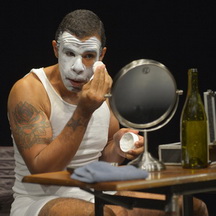Hamlet.
You may have seen it. Once or twice.
Or read it. Once or twice.
For over 400 years, Shakespeare’s Hamlet has reigned supreme over theatrical dramas, and has been in continuous production since it first appeared in London, likely in the year 1602. The list of actors who have played the role of the Prince of Denmark is formidable and long. From Richard Burbage, the leading tragedian of Shakespeare’s day, to today’s more familiar young stars, Benedict Cumberbatch, Jude Law and David Tennant. The list of players in between is mind-boggling.
This year Hamlet was chosen by Carey Perloff to open her final season as Artistic Director of A.C.T. The company last presented the play in 1990, before Perloff took over leadership of the company some 25 years ago. It is the first time she has directed the play, and it is the first time her lead actor, John Douglas Thompson, has played the role of Hamlet. Both have commented that the idea of doing Hamlet was “paralyzing” and “terrifying.” Understandable. The play carries a lot of stuff, and a lot of weight.
Among the challenges is making the play relevant to a contemporary audience. Shakespeare has made this easy, simply in his language. The text, which is unfailingly gorgeous, becomes even more so when used to describe the human mind in all its complex failings: in its fear of death, in its pervasive need to abuse and torture both others and itself, in its rejection of love and tenderness. All of those are writ large in the blank verse that flows from Hamlet’s unhappy thoughts. Their existential urgency overrides the story’s plot, which is (really) about the legitimacy of monarchical rule. Not a topic that is easily understood by the American mind, even under the current government’s insistence on domination legitimized by wealth and privilege.
The production is placed in a contemporary setting. Scenic and Costume Designer David Israel Reynoso has conjured up a bleak world of industrial warrens and concrete walls that seem to overpower and make vulnerable the generic slacks, dresses and uniforms of the costumes. James Ingalls’ lighting throws a sickly and toxic pallor over the sets. And the combination makes the supernatural elements of the play, especially the confrontations with the ghost of Hamlet’s father, utterly believable.
And what of Hamlet? Thompson’s prince differs substantially from the neurasthenic prototype of a man whose overthinking undoes his actions. Thompson is more robust, not in his movements, necessarily, but rather in his essential being. His Hamlet is a substantial man. One who considers and waits for the perfect moment, rather than flounders and vacillates, unable to grasp fleeting opportunity. Securing revenge is a proper chess game: intellectual, calculated and utterly lacking in compassion. There is no emotion in fear, only philosophy. He declares his monologue, “to be or not to be”, unflinchingly to the audience.
This clarity of purpose affects the entire cast. Even Polonius (played by Dan Hiatt) has a considered air, and lacks the conventional silliness in his pomposity. Ophelia (Rivka Borek) is less fragile, not collapsing into madness but grasping it like a weapon. Domenique Lozano’s lovely Gertrude is restrained and regal, and Steven Anthony Jones, ironically cast as the Ghost of the murdered king and Claudius, his murderer, delivers both roles solidly. All the characters move with an air of measured inevitability.
The audience was appreciative. The play continues to reign, its brilliance undiminished.
– Jaime Robles
A.C.T.’s Hamlet continues at the Geary Theater through October 15. For information and tickets, visit act-sf.org.
